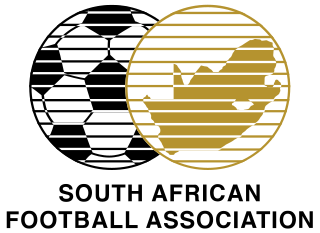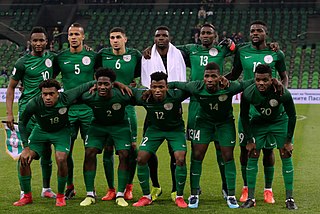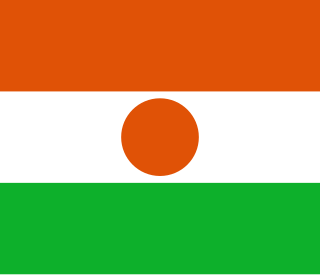
The South African Football Association is the national administrative governing body that controls the sport of football in the Republic of South Africa (RSA) and is a member of the Confederation of African Football (CAF). SAFA established in 1991. The South African Football Association is the second Football Association in South Africa to be named the South African Football Association and it is also the second football association in South Africa to affiliate to FIFA. The present day South African Football Association, unlike its predecessor allows for a mixed-race national team.

Football is the most popular sport in Nigeria. The Nigeria national football team competes regularly for international titles and many Nigerian footballers compete in Europe, particularly in England. Nigeria has one of the finest national teams in Africa and has produced many notable footballers including Mudashiru Lawal, Rashidi Yekini, Jay Jay Okocha, Nwankwo Kanu, Vincent Enyeama, Joseph Yobo, Mikel John Obi and Victor Osimhen.

The Burundi women's national football team, nicknamed the Swallows, represents Burundi in women's international football competitions. The team has competed since 2016 in matches recognised by FIFA, the sport's international governing body. A senior national team has been continually inactive, but an under-20 team has played in numerous matches. Further development of football in the country faces challenges found across Africa, including inequality and limited access to education for women. A women's football programme did not exist in Burundi until 2000, and only 455 players had registered for participation on the national level by 2006.

The Djibouti women's national football team represents the country in international competitions. Football is organised by the Djiboutian Football Federation, with women's football formally organised in the country in 2002, and a national team was later created.

The Kenya women's national football team represents Kenya in women's football and is controlled by the Football Kenya Federation.
The Liberia women's national football team represents Liberia in international women's football. It is governed by the Liberia Football Association. It has played in five FIFA recognized matches.
The Libya women's national football team is the national football team of Libya. It does not have FIFA recognition. It is not ranked by FIFA. There are development plans in the country to improve the state of women's football.

The Mauritania women's national football team represents Mauritania in international women's football and is controlled by the Football Federation of the Islamic Republic of Mauritania (FFIRM). The team played its first international match in 2019 as a friendly against Djibouti in which they lost three to one. Fatou Dioup scored Mauritania's first international goal.

The Niger women's national football team represents Niger in international women's football. It is governed by the Nigerien Football Federation. It has played in four FIFA recognised matches, two of which were losses to Burkina Faso women's national football team in 2007. There is an under-20 women's national team who were supposed to participate in the 2002 African Women U-19 Championship but withdrew before playing a game. There are problems that impact the development of the women's game in Africa that effect Niger.

The Rwanda women's national football team represents Rwanda in women's association football and is controlled by the Rwandese Association Football Federation. It had to date been scheduled to compete in one major tournament, the inaugural Women's Challenge Cup held in Zanzibar in October 2007, but the event was ultimately canceled. It has finally debuted in February 2014 against Kenya. The team is nicknamed The She-Amavubi.
The São Tomé and Príncipe women's national football team represents São Tomé and Príncipe in international women's football. It is governed by the São Toméan Football Federation. It has played in six FIFA recognised matches and has never been internationally ranked by FIFA. The country also has a national under-19 team.
Football is the most popular sport for women in Somalia. However, Somalia does not have a women's national football team with FIFA recognition, and have never played in a single international fixture. They are in a region that faces many challenges for the development of women's sport. Football is the most popular women's sport in the country and teams do exist for women to play on though they are few. Participation rates dropped by a large number in 2006. The sport's governing body in the country is not providing much support for the game and faces its own challenges.
The Sierra Leone women's national football team is governed by the Sierra Leone Football Association.
The Lesotho women's national under-17 team represents the country in international competitions.
The Lesotho women's national under-20 football team represents the country in international youth women's football competitions.
The Kenya women's national under-20 football team represents Kenya at an under-20 level in women's football and is controlled by the Football Kenya Federation.
Women's football in Africa can be divided into distinct historical periods. Football is one of several sports played by women in Africa with the sport facing several challenges during development. Initially seen as a male participant sport women have long held leadership and support roles within football in Africa.
Women's football in Nigeria has been increasing in popularity for many years. The Nigerian Women's Championship is funded by the government to improve the Nigeria women's national football team. Many females in Nigeria face prejudice for playing the sport.
Women's football in Seychelles faces several development problems inside the country including a lack of popularity for the sport, and few female players and teams. Women have gained football leadership positions in the country with one coaching a men's team and another umpiring international matches. There are other development issues for the sport that are ones facing the whole of Africa.
Women's football in Madagascar faces several development problems inside the country including a lack of popularity for the sport, and few female players and teams. Women have gained football leadership positions in the country with one coaching a men's team and another umpiring international matches. There are other development issues for the sport that are ones facing the whole of Africa.







